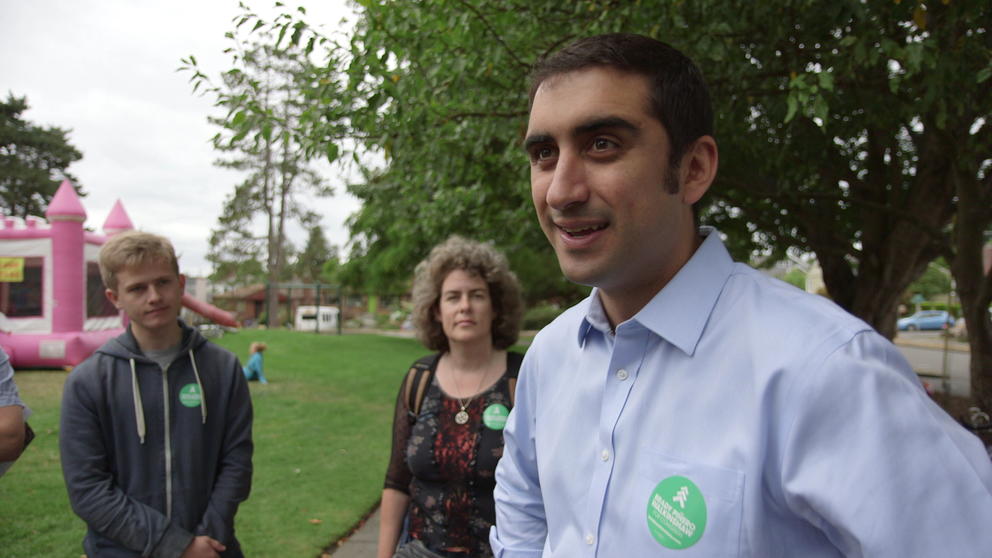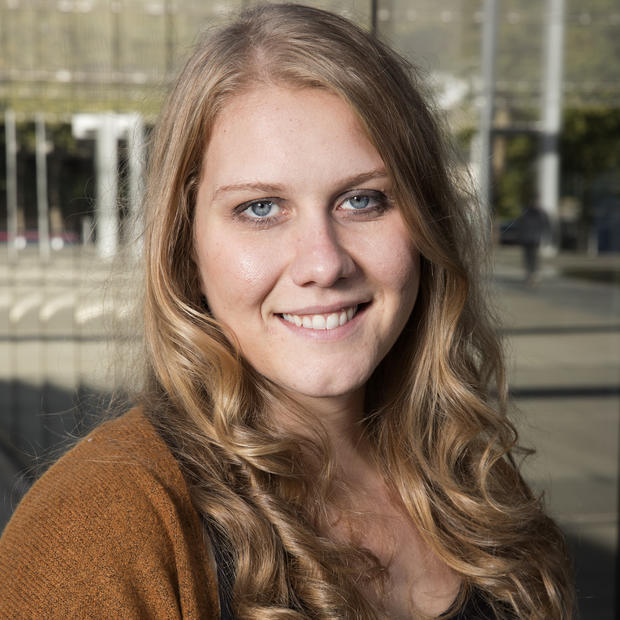This is the second profile on the 7th Congressional District race. Read about Pramila Jayapal here.
Brady Walkinshaw’s campaign office feels a bit like an early-stage tech start-up. Sitting on Stone Way in Wallingford, the walls are bare except for a few green “Brady Piñero Walkinshaw for Congress” signs in the windows. Most of the tables and chairs don’t match. “We had a supporter drop off a bookshelf today,” says one campaign staffer excitedly.
Walkinshaw’s campaign has had a scrappy feel to it from the beginning, when he announced last December that he would take on longtime incumbent Jim McDermott for the 7th Congressional District seat. (McDermott announced his retirement shortly thereafter.) It’s a stark contrast to that of his opponent, Pramila Jayapal, who has garnered national news attention and bases her campaign out of a chic work loft just off the waterfront, near the Olympic Sculpture Park.
Jayapal’s ground game and movement building (to say nothing of the money she spent on mailers and yard signs) earned her twice the votes of Walkinshaw in the August primary, putting Walkinshaw firmly in the role of underdog. But he’s optimistic that he can close the gap: He was polling in the single digits as late as July, but gained significant ground to finish second in the primary, with just over 21 percent of the vote.
“What I’m excited about is the momentum we brought into this campaign in July,” Walkinshaw says. “We started communicating more directly with voters and saw that we really picked up speed at a very quick rate.”
Walkinshaw, 32, is a politician who has very much stayed out of the spotlight. But civic activist Morgan Beach says he has been quietly getting things done behind the scenes in the Washington House of Representatives.
“I want people to recognize that he isn’t just a 30-year-old guy talking about environmental justice,” Beach says. “He is a broader candidate than I think people have given him credit for and it’s because of years of long thankless work. He shows up to every quiet coffee and every meeting where he doesn’t get public recognition. He is all about other people.”
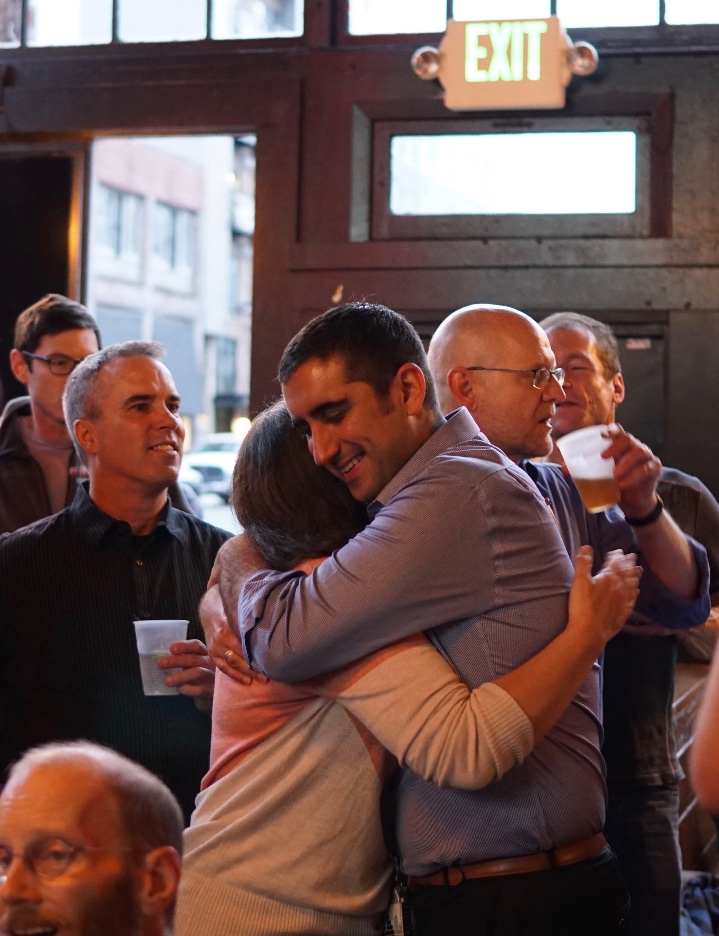
It’s a mentality that may have come from growing up in the Nooksack Valley in rural Whatcom County. As a kid, he worked summers in the berries alongside Latino migrant workers. Eighty to 90 percent of his classmates were on reduced-price lunches, he says, and half of his incoming high school class didn’t graduate.
Walkinshaw could have grown up in Seattle. His family has roots here dating back to the 1870s. His grandparents were heavily involved in civic issues and his grandfather Walt Walkinshaw was a well-known attorney. But his parents chose a different path.
“They were pretty involved in peace activism,” Walkinshaw says. “They were kind of hippies and wanted to live off the land so they bought a bunch of land on a side of a mountain.”
His father farmed vegetables and his mother taught in the public schools, running the English Learners program. A Cuban immigrant, she spoke to Brady only in Spanish, while his father spoke in English. Walkinshaw’s first word, yelled at an uncooperative toy, was “abre” — Spanish for “open.”
But there was something else that set him apart from many of the other kids. He was gay.
“I didn’t come out until after high school and I didn’t know anyone who was openly LGBTQ until I was in college, and when you don’t have role models you can’t really understand,” Walkinshaw says.
A strong student, Walkinshaw won a scholarship to Princeton University. He says he was the first person from Nooksack Valley High School to go to an Ivy League school. While there, he took part in student activism and became interested in international affairs. After college, he volunteered for AmeriCorps in a public school in New Jersey.
In 2006, Walkinshaw went to Honduras as a Fullbright Scholar. While living there, he founded a small nonprofit called Proyecto Villa Nueva, which works to bring extracurricular school programs into urban slums.
After a few years abroad, Walkinshaw moved back to Seattle to work for the Gates Foundation on food and nutrition policy in developing countries. He was appointed to his 43rd Legislative District seat in 2013 to fill a vacancy, then ran for the seat and won a year later. While in office, he helped pass bills through a divided legislature on criminal justice, mental health and opiate addiction.
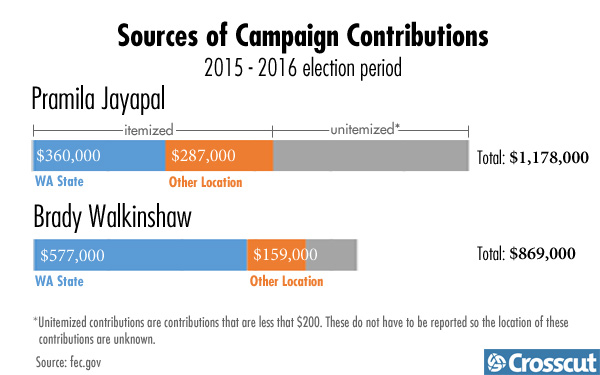
A sophomore state legislator challenging a longtime Congressional incumbent like McDermott was a bold move.
“One reason I came onto this campaign is that I was really struck by Brady’s courage in entering the race early,” says Alli O’Neil, Field Director for the campaign.
Now, up against Jayapal, he has his work cut out for him.
“Senator Jayapal and I share a lot of common values,” Walkinshaw says. “I think the question for people is not who is most progressive, but who will most effectively deliver on the values that we share.”
Walkinshaw says his campaign is locally focused, while Jayapal’s has more of a national agenda. He is focused on the environment, climate change, transit and housing while Jayapal talks about expanding the middle class, racial justice and immigration reform.
That difference in focus appears to play out on the financial side as well. A review of itemized campaign contributions shows that 56 percent of the money donated to Jayapal's campaign came from within Washington state. For Walkinshaw, in-state contributions amount to 78 percent. (Non-itemized contributions, in gray in the graph above, include contributions of less than $200, PACs or party committees.)
“That says a lot about the coalition we’ve built,” Walkinshaw says. “It’s a coalition of people who are in our community and believe in my message. Raising money locally keeps you grounded in the community you are running to represent."
That’s one reason Chris Bayley, former King County Prosecutor and longtime Republican, decided to endorse Walkinshaw. “The fact (that Jayapal) has raised a lot of out-of-state money by people who are really interested in a cause, rather than the people and voters of the 7th District, is somewhat discouraging to me,” Bayley says.
“As a Republican in these districts, I’m disenfranchised, so I look for someone who is a common-sense person who will listen to both sides,” Bayley says. “I’ve been told by other legislators that (Walkinshaw) is one of the House members who paves the way to compromise between the left and the right to get something done on issues before them.”
It’s a theme that many Walkinshaw supporters bring up: his ability to reach across the aisle. He is well-known for putting together a bipartisan coalition to pass “Joel’s Law,” which makes it easier for family members to intervene and seek care for a mentally ill person.
Walkinshaw says growing up in a rural area helps him to understand how legislators from rural parts of the state think. In the Nooksack Valley, he was surrounded by people who didn’t see things the way he did.
“Brady is missing something that most politicians have — in the best way possible,” Beach says. “I hang out with a lot of people who run for office and they have this ego thing — like, ‘I’m willing to work with the best, I have the best ideas’ — but Brady is all about other people. He has a humbleness about him and a quiet, get-stuff-done attitude.”
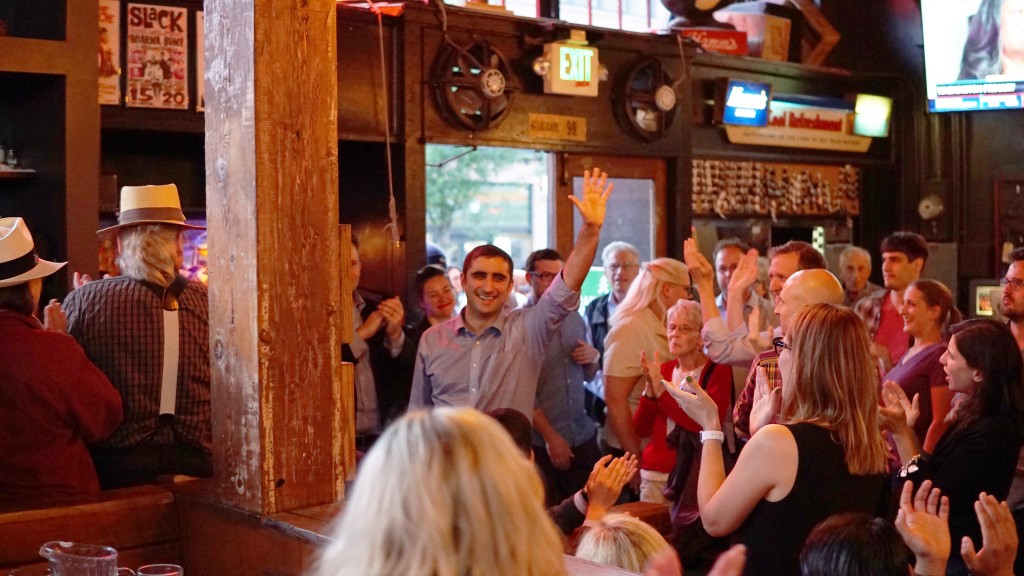
But “quiet” may not serve Walkinshaw well in the general election. To beat Jayapal, he will have to capture the votes of moderate or liberal Republicans like Bayley, plus many of the progressives Jayapal grabbed in the primary — a race in which she won 42 percent of the vote to Walkinshaw’s 21 percent.
In the primary, Walkinshaw barely squeaked by candidate Joe McDermott, who took 19 percent of the vote. McDermott, a West Seattle resident and Chair of King County Council, fought hard on issues like gun violence, campaign finance and climate change. McDermott appealed to pragmatic, middle-of-the-road Democrats, and his endorsement gives Walkinshaw a leg up with these voters, according to political analyst Ben Anderstone.
Anderstone says Walkinshaw is well positioned to pick up voters from eliminated candidates in more moderate areas. This includes middle class suburbs, wealthier areas, more established single family neighborhoods and parts of Snohomish County.
“Those are the places Brady seems to be adept at getting votes, and they might end up leaning his way with some persuasion,” Anderstone says.
An internal poll released by Jayapal at the end of August had her leading by 14 points. Walkinshaw’s campaign argues the poll shows Jayapal doing little better than she did in the primary, with 43 percent of the vote, while Walkinshaw has jumped from his 21-percent primary vote to 29 percent in the poll.
Only 196,503 people voted in the primary election. Walkinshaw staffers estimate over 400,000 people will vote in the general election. “The margin was big in the primary, but the electorate for the general is so much bigger,” field director O’Neill says. “There are so many undecided voters and we need to reach out to everyone.”
To make up ground with moderate voters, Anderstone says Walkinshaw is going to need to get opinion leaders on his side. Think moderate state legislators who aren’t from Seattle, or local business people and civic activists who are trusted in communities.
“Those people can access moderate voters without making the campaign do things that would antagonize the progressive base,” Anderstone says.
It’s the 7th Congressional District after all, and progressivism is what wins. Walkinshaw isn't likely to make any grand overtures to moderates and Republicans.
“You’ll see more outreach in terms of him pitching himself as a good pragmatic policy person, not an ideologue, but rather a problem solver,” Anderstone says. “It’ll be more ‘I’m a down-to-earth progressive who addresses issues that I think we can all agree affect every community in our district.’”
It’s a message Walkinshaw seems to be heeding. During a 45-minute interview back at his campaign headquarters on Stone Way, he boasts that he “builds bridges” no fewer than 21 times.
Ballots begin to arrive in mailboxes in about a month. Walkinshaw has until then to build a bridge big enough to span the gap between himself and Jayapal.
More reading: "Why Pramila Jayapal is winning"
*The internal poll released by Jayapal actually had her leading by 14 points, not 12.
*The graph in this story has been replaced to indicate itemized donations from within the state.

